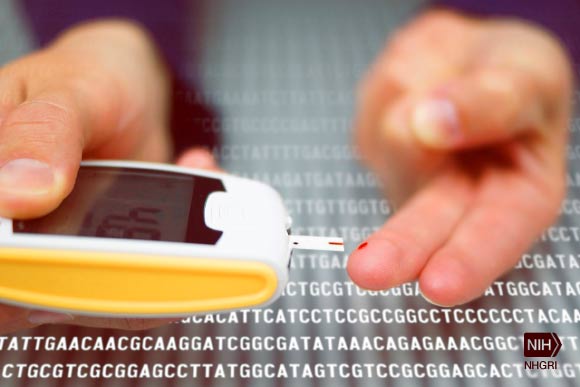A body of research putting type 2 diabetes patients on a low calorie diet has confirmed that the condition is reversible. For many patients it can be reversed with sustained weight loss of around 15 kg, according to a paper published in the journal BMJ.

A finger stick helps patients with diabetes take control of their blood sugar levels. Image credit: Darryl Leja National, Human Genome Research Institute.
Type 2 diabetes, generally perceived as progressive and incurable, now affects 5-10% of the population.
Until complications develop, most patients are managed entirely within primary care, with diabetes comprising a major part of general practice activity. International figures suggest that medical costs for people with diabetes are twofold to threefold greater than the average for age and sex matched people without diabetes.
Remission of diabetes (no longer having diabetes, at least for a period) is clearly attainable for some, possibly many, patients but is currently very rarely achieved or recorded.
“The good news for people with type 2 diabetes is that our work shows that even if you have had the condition for 10 years, you are likely to be able to reverse it by moving that all important tiny amount of fat out of the pancreas. At present, this can only be done through substantial weight loss,” said co-author Professor Roy Taylor, of Newcastle University, UK.
The body of research confirms his ‘Twin Cycle Hypothesis’ — that type 2 diabetes is caused by excess fat actually within both liver and pancreas.
“This causes the liver to respond poorly to insulin,” Professor Taylor explained. “As insulin controls the normal process of making glucose, the liver then produces too much glucose. Simultaneously, excess fat in the liver increases the normal process of export of fat to all tissues. In the pancreas, this excess fat causes the insulin producing cells to fail.”
“Patients and doctors may not realize that type 2 diabetes can be reversed, and we call for greater awareness, documentation, and surveillance of remissions to improve health outcomes and reduce healthcare costs,” the authors said.
“Current guidelines advise reducing blood sugar levels and cardiovascular risks, primarily with drugs and general lifestyle advice. But many patients still develop complications and life expectancy remains up to six years shorter than in people without diabetes.”
“The diagnosis also carries important social and financial penalties for individuals, as well as poor health prospects. In contrast, consistent evidence shows that weight loss is associated with extended life expectancy for people with diabetes, and that weight loss of around 15 kg often produces total remission of type 2 diabetes.”
Achieving remission not only has health benefits, it produces a strong sense of personal achievement and empowerment, removes stigma, and may even reduce insurance premiums.
“Yet remission is rarely recorded,” the researchers said.
“For example, a US study found remissions in only 0.14% of 120,000 patients followed for seven years, while the Scottish Care Information Diabetes database, which includes every patient in Scotland, shows that less than 0.1% of those with type 2 diabetes were coded as being in remission.”
Professor Taylor and co-authors suggest that lack of agreed criteria and guidance over recoding may have led to hesitation in coding remission, but the main reason for the low recording is probably that few patients are attempting or achieving remission.
“It is in everybody’s interest to reclassify people with type 2 diabetes when they become non-diabetic. Official guidelines and international consensus for recording diabetes in remission are needed,” they said.
“Appropriate coding will make it possible to monitor progress in achieving remission of type 2 diabetes nationally and internationally and to improve predictions of long term health outcomes for patients with a known duration of remission.”
_____
Louise McCombie et al. 2017. Beating type 2 diabetes into remission. BMJ 358: j4030; doi: 10.1136/bmj.j4030







